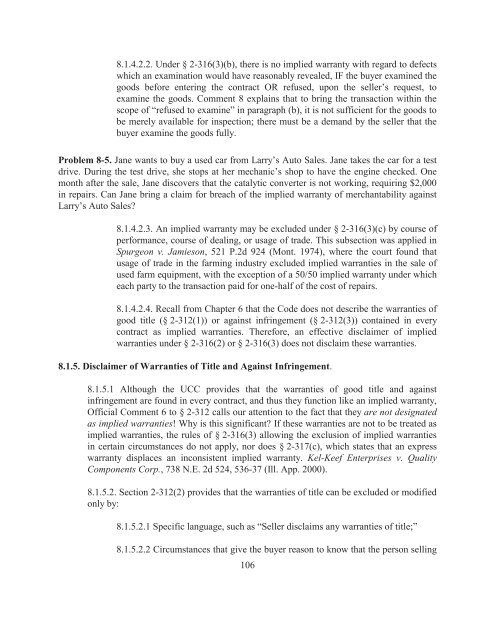Sales and Leases - A Problem-based Approach, 2016a
Sales and Leases - A Problem-based Approach, 2016a
Sales and Leases - A Problem-based Approach, 2016a
You also want an ePaper? Increase the reach of your titles
YUMPU automatically turns print PDFs into web optimized ePapers that Google loves.
8.1.4.2.2. Under § 2-316(3)(b), there is no implied warranty with regard to defects<br />
which an examination would have reasonably revealed, IF the buyer examined the<br />
goods before entering the contract OR refused, upon the seller’s request, to<br />
examine the goods. Comment 8 explains that to bring the transaction within the<br />
scope of “refused to examine” in paragraph (b), it is not sufficient for the goods to<br />
be merely available for inspection; there must be a dem<strong>and</strong> by the seller that the<br />
buyer examine the goods fully.<br />
<strong>Problem</strong> 8-5. Jane wants to buy a used car from Larry’s Auto <strong>Sales</strong>. Jane takes the car for a test<br />
drive. During the test drive, she stops at her mechanic’s shop to have the engine checked. One<br />
month after the sale, Jane discovers that the catalytic converter is not working, requiring $2,000<br />
in repairs. Can Jane bring a claim for breach of the implied warranty of merchantability against<br />
Larry’s Auto <strong>Sales</strong>?<br />
8.1.4.2.3. An implied warranty may be excluded under § 2-316(3)(c) by course of<br />
performance, course of dealing, or usage of trade. This subsection was applied in<br />
Spurgeon v. Jamieson, 521 P.2d 924 (Mont. 1974), where the court found that<br />
usage of trade in the farming industry excluded implied warranties in the sale of<br />
used farm equipment, with the exception of a 50/50 implied warranty under which<br />
each party to the transaction paid for one-half of the cost of repairs.<br />
8.1.4.2.4. Recall from Chapter 6 that the Code does not describe the warranties of<br />
good title (§ 2-312(1)) or against infringement (§ 2-312(3)) contained in every<br />
contract as implied warranties. Therefore, an effective disclaimer of implied<br />
warranties under § 2-316(2) or § 2-316(3) does not disclaim these warranties.<br />
8.1.5. Disclaimer of Warranties of Title <strong>and</strong> Against Infringement.<br />
8.1.5.1 Although the UCC provides that the warranties of good title <strong>and</strong> against<br />
infringement are found in every contract, <strong>and</strong> thus they function like an implied warranty,<br />
Official Comment 6 to § 2-312 calls our attention to the fact that they are not designated<br />
as implied warranties! Why is this significant? If these warranties are not to be treated as<br />
implied warranties, the rules of § 2-316(3) allowing the exclusion of implied warranties<br />
in certain circumstances do not apply, nor does § 2-317(c), which states that an express<br />
warranty displaces an inconsistent implied warranty. Kel-Keef Enterprises v. Quality<br />
Components Corp., 738 N.E. 2d 524, 536-37 (Ill. App. 2000).<br />
8.1.5.2. Section 2-312(2) provides that the warranties of title can be excluded or modified<br />
only by:<br />
8.1.5.2.1 Specific language, such as “Seller disclaims any warranties of title;”<br />
8.1.5.2.2 Circumstances that give the buyer reason to know that the person selling<br />
106


















